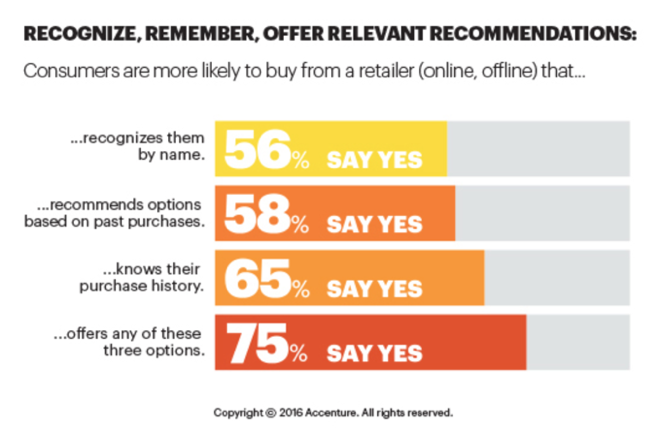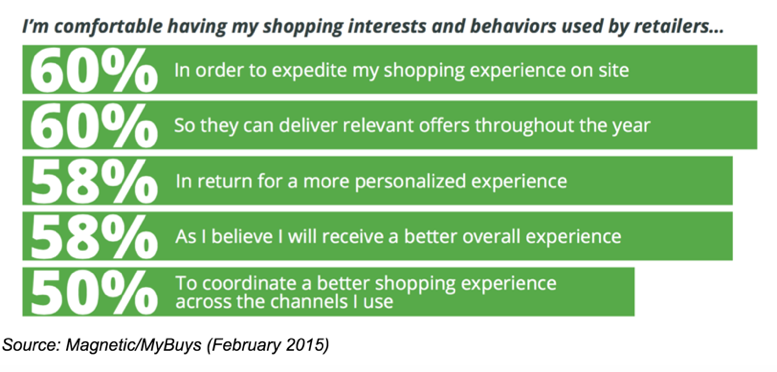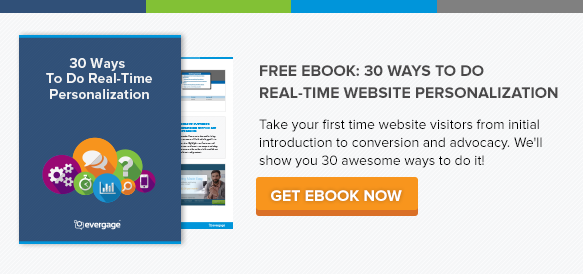At Evergage, we frequently discuss how personalization can assist marketers in increasing conversions, enhancing engagement, and fostering loyalty.
We’re not the only ones highlighting the advantages for marketers — analysts continue to report successful outcomes and future trends. For instance, Gartner discovered that by 2020, smart personalization engines that identify customer intent will allow digital businesses to boost their profits by as much as 15%.
But personalization is about more than driving KPIs for the marketer – it’s about providing a better experience for the customer.
Consumers recognize that personalization gives them more enjoyable and relevant experiences that help them accomplish their goals. They are now demanding these personalized experiences from the businesses they interact with.
The stats we compiled in this post highlight how consumers feel about personalization.
Key Consumer Personalization Statistics
- Personalized Shopping Preferences:
- 75% of consumers are more likely to buy from retailers that recognize their name, recommend based on past purchases, or know their purchase history (Accenture).
- 59% of customers state that personalization influences their shopping decisions (Infosys).
- 77% of consumers have chosen, recommended, or paid more for a brand offering personalized service or experience (Forrester).
- Consumer Frustrations with Non-Personalization:
- 74% of customers feel frustrated when website content is not personalized (Infosys).
- 63% are highly annoyed by brands using repetitive, generic ad messages (Marketo).
- 63% of consumers think more positively of brands providing valuable, relevant content (Rapt Media).
- Data Sharing for Personalization:
- Over 78% of consumers will only engage with offers personalized to their previous interactions with a brand (Marketo).
- Consumers are increasingly willing to share behavioral data to receive tailored shopping experiences (Magnetic/MyBuys).
Consumers Want to Be Known
According to a recent report from Accenture, 75% of consumers are more likely to buy from a retailer that recognizes them by name, recommends options based on past purchases, OR knows their purchase history (see graph below). Consumers are willing to shop more with retailers that show that they recognize each individual and can provide appropriate recommendations based on their unique needs.
Personalization Impacts How Consumers View a Brand
Relationships with brands can often be driven by emotions. Feelings derived from a good or bad experience can make their way into a person’s feelings about the brand itself. These days, consumers are feeling frustrated by non-personalized and irrelevant experiences.
- 74% of customers feel frustrated when website content is not personalized [Infosys]
- 63% of respondents are highly annoyed by the way brands continue to rely on the old-fashioned strategy of blasting generic ad messages repeatedly [Marketo]
- 63% of consumers said they’d think more positively of a brand if it gave them content that was more valuable, interesting or relevant [Rapt Media]
Personalization Impacts How Consumers Shop
When consumers think more positively about a brand, they are more likely to shop, buy, or even recommend that brand to others. Personalization can lead to positive experiences that, in turn, lead to more engagement and purchases.
- 59% of customers say that personalization influences their shopping decision [Infosys]
- 77% of consumers have chosen, recommended, or paid more for a brand that provides a personalized service or experience [Forrester]
- Over 78% of consumers will only engage offers if they have been personalized to their previous engagements with the brand [Marketo]
Consumers are Willing to Share Data to Get Personalized Experiences
Consumers understand that to have personalized shopping experiences, marketers need to track their behaviors. A survey from Magnetic/MyBuys found that consumers are willing to allow retailers to use their interests and behaviors to provide a better experience for them (see graph below).
The Role of AI in Personalization
- Data Analysis: AI processes extensive datasets, including demographics, browsing history, and purchase patterns, to uncover insights into customer preferences. This analysis facilitates the creation of personalized experiences that resonate with each user.
- Predictive Personalization: Leveraging machine learning algorithms, AI predicts future customer behaviors, enabling proactive engagement through personalized recommendations and offers.
- Content Customization: AI-driven tools generate personalized content, such as product recommendations and targeted marketing messages, enhancing customer engagement and satisfaction.
Data Analysis
AI processes extensive datasets, including demographics, browsing history, purchase patterns, and real-time interactions, to uncover insights into customer preferences. This analysis is crucial for creating highly relevant experiences.
Key Stat: Over 91% of consumers are more likely to shop with brands that provide relevant offers and recommendation
Example: Netflix leverages AI to analyze user viewing history, providing content recommendations that result in over 80% of watched content being algorithmically recommended.
Predictive Personalization
By using machine learning algorithms, AI predicts future customer behaviors, enabling proactive engagement through personalized recommendations, emails, or offers.
- Key Stat: Predictive personalization can increase conversion rates by up to 20% for e-commerce businesses.
- Example: Amazon’s predictive analytics to recommend products based on previous purchases and browsing behavior, contributing to over 35% of its total sales.
Content Customization
Companies use tools generate personalized content for emails, social media posts, websites, and even in-app experiences. This real-time tailoring enhances customer engagement and satisfaction.
- Key Stat: Personalized email campaigns driven by AI see 29% higher open rates and 41% higher click-through rates compared to non-personalized emails.
- Example: Spotify’s AI curated playlists such as Discover Weekly, leading to millions of new track discoveries daily.
Deeper Impact of AI-Driven Personalization
1. Enhanced Customer Experience
AI tailors every interaction to individual customer needs, creating a frictionless and enjoyable experience.
- Stat: 80% of consumers are more likely to purchase when brands offer personalized experiences.
- Example: Sephora’s AI-powered Virtual Artist customers to virtually try on products, increasing engagement and sales.
2. Efficient Resource Allocation
AI enables businecus resources where they are most effective, automating repetitive tasks while personalizing at scale.
- Stat: AI-driven automation can save up to 20-30% of marketing budgets by increasing efficiency.
- Example: HubSpot uses AI to segment audiences automatically, reual effort and optimizing campaign targeting.
3. Increased ROI
AI personalization ensures that marketing spend yiem return by delivering what customers truly want.
- Stat: Businesses that use AI for personalization report a 20% increase in sales opportunities.
- Example: Stitch Fix uses AI to curate fashion boxes, resulting in 3.4 million acts and $1.7 billion in revenue in 2021.
Future Trends in Personalization
- Hyper-Personalization: Advancements in AI and machine learning are paving the way for hyper-personalization, where businesses can deliver highly individualized experiences by analyzing real-time data and contextual information.
- Omnichannel Personalization: The integration of AI across multiple channels ensures a seamless and consistent personalized experience, whether customers engage via websites, mobile apps, or in-store interactions.
- AI-Powered Customer Service: The deployment of AI chatbots and virtual assistants is enhancing customer service by providing instant, personalized responses, thereby improving customer satisfaction and loyalty.
Final Thoughts
Consumers are asking for personalized experiences.
They are increasingly recognizing that they will shop or engage more with sites that offer personalization, and are becoming frustrated when they encounter anything irrelevant. Marketers that have incorporated personalization into their strategies are better positioned to surprise and delight their customers
Discover how Evergage clients have provided personalized experiences to drive success by taking a look at our many case studies.
Read more:


